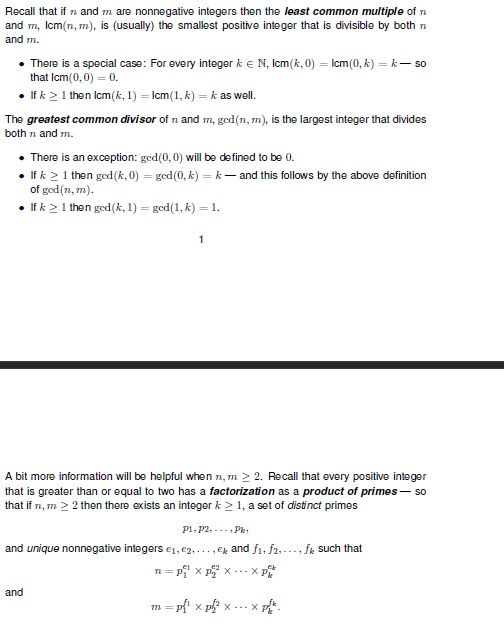

Recall that if n and m are nonnegative integers then the least common multiple of n and m, Icm(n,m), is (usually) the smallest positive integer that is divisible by both n and m. There is a special case: For every integer k e N, Icm(5,0) = Icm(0, k) = kso that Icm(0,0) = 0. If & > 1 then Icm(k, 1) = Icm(1,k) = k as well. The greatest common divisor of n and m, ged(n, m), is the largest integer that divides both n and m. There is an exception: gcd(0,0) will be defined to be 0. If k > 1 then god (k, 0) = ged(0, k) = k and this follows by the above definition of god (nm). . If k > 1 then ged(k,1)= ged(1,k) = 1. 1 A bit more information will be helpful when n, m > 2. Recall that every positive integer that is greater than or equal to two has a factorization as a product of primes - so that if nm > 2 then there exists an integer k > 1, a set of distinct primes P1, P2, ... Ple: and unique nonnegative integers 1,C2, ..., ek and f1, f2,..., f such that n=x x x P* and m =>{x xx P. Prove that the functions Icm(7), m) and ged(n, m) of n and m are both primitive recursive functions. Recall that if n and m are nonnegative integers then the least common multiple of n and m, Icm(n,m), is (usually) the smallest positive integer that is divisible by both n and m. There is a special case: For every integer k e N, Icm(5,0) = Icm(0, k) = kso that Icm(0,0) = 0. If & > 1 then Icm(k, 1) = Icm(1,k) = k as well. The greatest common divisor of n and m, ged(n, m), is the largest integer that divides both n and m. There is an exception: gcd(0,0) will be defined to be 0. If k > 1 then god (k, 0) = ged(0, k) = k and this follows by the above definition of god (nm). . If k > 1 then ged(k,1)= ged(1,k) = 1. 1 A bit more information will be helpful when n, m > 2. Recall that every positive integer that is greater than or equal to two has a factorization as a product of primes - so that if nm > 2 then there exists an integer k > 1, a set of distinct primes P1, P2, ... Ple: and unique nonnegative integers 1,C2, ..., ek and f1, f2,..., f such that n=x x x P* and m =>{x xx P. Prove that the functions Icm(7), m) and ged(n, m) of n and m are both primitive recursive functions








